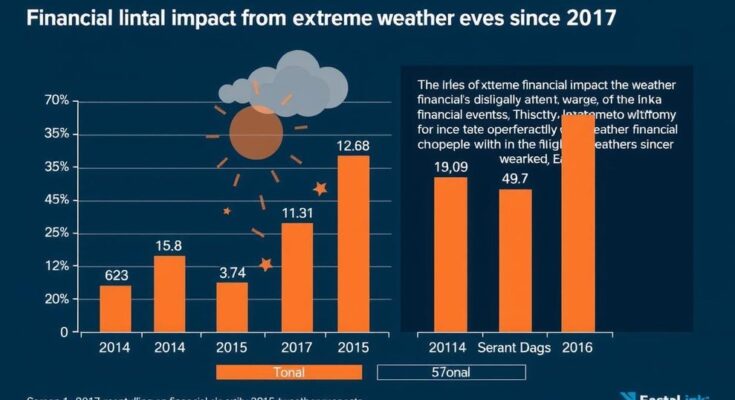Insured losses from natural disasters hit $140 billion, the highest since 2017. Hurricanes Milton and Helene were the costliest events of 2024, alongside deadly floods in Dubai and Spain. The surge in losses correlates with rising global temperatures, marked by the planet’s hottest year on record. Major insurers are reassessing risks to coverage areas as climate impacts grow.
Insured losses arising from natural catastrophes reached a staggering $140 billion in the previous year, marking the highest total since 2017 and significantly surpassing the 30-year average. Hurricanes Milton and Helene were identified as the most financially burdensome natural disasters of 2024, according to a report by Munich Re. Furthermore, severe flooding occurrences in Dubai and Spain’s Valencia region, which tragically claimed over 200 lives, contributed to substantial insurance claims.
As this year began, wildfires in the Los Angeles area are projected to cause unprecedented financial damage in insurance markets. This trend of increased natural catastrophes aligns with rising global temperatures; for instance, last year was recorded as the warmest on record, with the Copernicus Climate Change Service documenting a global average temperature of 1.62°C above pre-industrial levels, surpassing the critical threshold of 1.5°C.
Tobias Grimm, the chief climate scientist at Munich Re, highlighted the growing consensus around the influence of climate change on the frequency and severity of weather-related disasters. He noted that locations such as Dubai, traditionally not viewed as flood-prone, are experiencing unexpected weather patterns. The evidence indicates that as temperatures rise, intense rainfall events become more common, while tropical cyclones are increasingly escalating in strength as they form.
Specifically, Hurricane Milton, which impacted Florida in October, incurred $25 billion in insured losses, narrowly avoiding catastrophic damage to the heavily populated Tampa metropolitan area. Hurricane Helene added another $16 billion in losses just weeks prior. Last year’s total damages from natural disasters reached $320 billion, the highest total seen since 2021, with weather-related incidents accounting for 93% of overall losses and 97% of insured losses. Approximately 11,000 fatalities are attributed to natural disasters in 2024, as reported by Munich Re.
In response to the uptick in extreme weather events, insurers are increasingly hesitant to provide coverage in high-risk areas. However, Mr. Grimm clarified that with appropriate premiums, all risks can theoretically be insured. Munich Re generally does not exclude areas from coverage solely based on climate change considerations.
The report highlights the significant financial impact of natural disasters, exacerbated by climate change. The increase in insured losses since 2017 signifies a troubling trend in the frequency and severity of extreme weather events such as hurricanes, floods, and wildfires. This evolution in climate patterns is not only reshaping insurance markets but also raising concerns about global safety as more lives are adversely affected by these calamities. Understanding the connection between rising temperatures and more intense weather phenomena is crucial for mitigating future economic repercussions and preparing adequate insurance strategies.
The rising financial toll of natural disasters, now peaking at $140 billion in insured losses, underscores the urgent need for enhanced climate resiliency strategies amidst increasingly extreme weather conditions. As global temperatures continue to rise, historical norms for weather patterns are being redefined, necessitating a reassessment of insurance protocols and coverage areas to safeguard communities and economies. These developments call attention to the critical interplay between climate change and its broader impacts on human life and infrastructure.
Original Source: www.bnnbloomberg.ca




